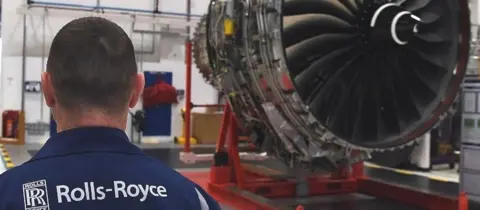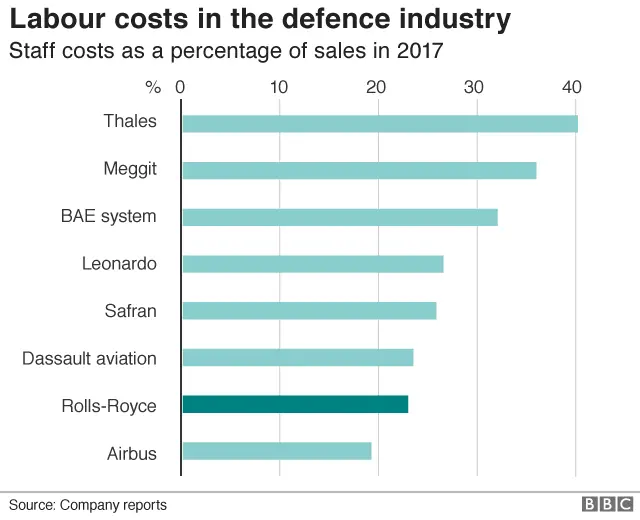Rolls-Royce announces 4,600 job cuts
Engineering firm Rolls-Royce is to cut 4,600 jobs over the next two years as part of a major reorganisation.
Middle managers and back-office staff are to bear the brunt of the cuts, which are expected to hit its Derby base hard.
The company is refocusing its business on civil aerospace, defence and power systems.
About a third of the job cuts are expected to happen by the end of this year, Rolls-Royce said.
The programme is expected to continue throughout 2019, with full implementation by mid-2020.
Rolls-Royce said that the programme would cost £500m to carry out, including redundancies, but would save it £400m a year by the end of 2020.
The firm also said it would continue to work on its problems with its Trent 1000 engine.
Parts in the engines have been wearing out faster than anticipated, causing some planes to be grounded. Rolls-Royce has said it will take years to modify all the engines in service.

Analysis:
Dominic O'Connell, Today programme business presenter
 Getty Images
Getty ImagesWarren East took over at Rolls-Royce in the middle of a full-sized crisis - five successive profits warnings had led shareholders to question whether the company's management was actually in control.
He could have taken drastic action then, but company insiders say his first priority was to steady the ship and reassure the City the company was not on a fatal downward spiral. That has largely been achieved.
That is crucial to shareholders, because it offers a measure of Rolls-Royce delivering on its "jam tomorrow" promise of turning its increasing sales of engines - on which the company loses money - into profitable service and maintenance activities in a few years' time.
Now Mr East is carrying out the next stage of the plan, cutting the middle-management fat to make Rolls-Royce even more profitable.
But big strategic challenges await. There is a big crossroads looming in the shape of a new generation of small aircraft. Rolls-Royce missed out on this market last time round and probably cannot afford to do so again.

Compulsory redundancies 'inevitable'
Chief executive Warren East told the BBC's Today programme that Rolls-Royce needed fewer layers of management: "We have too complex a management and support organisation and we need to simplify that so that we can remain competitive."
He said the cuts would be "most strongly felt" in Derby, since that was where most of those functions were based.
Mr East said it was "inevitable" that there would be some compulsory redundancies because of the timescale of the programme, although the firm would honour its commitments to unions.
Chris Williamson, Labour MP for Derby North, said the job cuts were "a damning indictment" of the government's hands-off industrial policy.
"Currently we have private shareholders directing the fate of some of Britain's most premier firms, with total disregard for the economic needs of the country. The government has to intervene," he said.
A spokesperson from the Department for Business said: "The government is in regular contact with Rolls-Royce on its plans to reduce its back office and support functions workforce as a result of its restructuring programme.
"This is clearly an uncertain time for affected employees and their families and Jobcentre Plus Rapid Response stands ready to help people back into employment as soon as possible.
"Rolls-Royce continues to invest in its UK operations, most recently with an additional £150m in a new large engine test-bed facility in Derby, positioning it to grow further and support increased engine production to deliver on its record order book."

Shares in Rolls-Royce were up 4% shortly after midday.
Nicholas Hyett, equity analyst at Hargreaves Lansdown, said: "A slimmer, more efficient Rolls Royce is good for UK aerospace in the long run, though job losses along the way mean the journey comes with a cost."
The company's earnings for 2017 were better than expected, with profits before tax of £4.9bn.
That followed a £4.6bn loss in 2016 - the largest in Rolls-Royce's history - due to settling corruption cases and currency hedges going wrong, among other factors.
In June 2017, Rolls-Royce cut a deal with unions to safeguard 7,000 front-line engineering jobs in the East Midlands for five years and invest in UK aerospace facilities.
